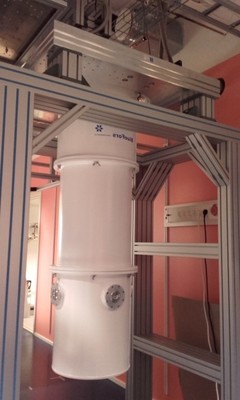Bose-Einstein condensation is an intriguing phenomenon predicted by Einstein in 1925. When the temperature of a gas of bosons (particles with integer spin) decreases below a certain critical temperature (depending on the mass and density), a large fraction of these particles collapses into a single state, showing quantum behavior on a macroscopic scale. Bose-Einstein condensation explains the amazing properties of superfluid helium and of superconductors at low temperatures. In 1995 Cornell and Wieman managed to create Bose-Einstein condensation in a dilute gas of atoms confined in a trap. The goal of our project is to create a Bose-Einstein condensate of excitons. An exciton is a bound state of an electron and a hole in a semiconductor. We optically create long-lived excitons in a Cu2O single crystal and we cool these excitons below the critical temperature in a dilution refrigerator with optical windows (see picture), which can reach the extremely low temperature of 10 mK (= 0.01 K). We study the optical and superfluid properties of the condensate.
Students
Students interested in this project are welcome to contact Dr. Marijn Versteegh. Possible student projects involve working with advanced equipment, such as a dilution refrigerator, pulsed lasers, spectrometers and single-photon detectors. We also have opportunities for students interested in theory of excitonic Bose-Einstein condensation.

